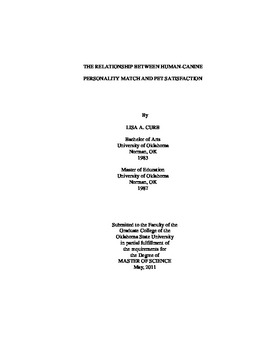| dc.contributor.advisor | Abramson, Charles Ira | |
| dc.contributor.author | Curb, Lisa A. | |
| dc.date.accessioned | 2014-04-15T22:23:37Z | |
| dc.date.available | 2014-04-15T22:23:37Z | |
| dc.date.issued | 2011-05-01 | |
| dc.identifier.uri | https://hdl.handle.net/11244/9411 | |
| dc.description.abstract | I tested the hypothesis that pet-to-owner personality-matching may improve pet-owner satisfaction on an instrument I designed. If a prospective pet owner adopted a dog with similar personality characteristics, the pet owner may be more satisfied with the pet and less likely to relinquish it. The 88 participants had self-selected their dog. The participants worked in a veterinarian clinic/hospital, zoo, grooming parlor or were employed as university faculty or graduate students. The survey consisted of 45 questions about the dog and 45 questions about the participants. A satisfaction rating and demographic survey were used. Out of the 45 traits for a possible human-to-pet match, there were four matches. The one slightly moderate correlation is stated below, followed by three weak correlations. These results do indicate a trend in human-to-pet matches. Both humans and dogs are willing to share possessions and make an attempt to get along with others. Both enjoyed running outside together. The dog owner is not likely to leave trash such as wrappers around, and the dog does not chew up items, so the living space is clean. Further, there was a trend for people highly satisfied with their pets to own a dog that had certain behaviors. These included dogs that greeted them by running up to them, shared toys and food, and refrained from tearing up items. A trend existed to show that people who were highly satisfied with their dog had particular personality characteristics themselves. They were more motivated to exercise rather than lounge on the sofa, but were not likely to go running outside without a pet. Further, they tended to be satisfied with the routine of everyday life. These people seem well adjusted in that they are not likely to tear up anything when anxious or insist on getting their own way in situations of everyday life. Despite the few significant results, the research provides an important contribution to the literature in that it demonstrates the challenge of isolating personality of dogs and prospective owners for the purpose of matching them during pet adoption. This study is helpful in advancing the idea of certain personality matching that might be effective to some slight degree for some who share the aforementioned traits. However, overall, this study did not achieve the desired significance level. It had limitations regarding statistical power in that there were few who were not satisfied with their dog, including even some who had returned a dog. More participants who returned dogs were needed to be able to have enough power to analyze this population separately The goal is to reduce the number of dogs relinquished. | |
| dc.format | application/pdf | |
| dc.language | en_US | |
| dc.publisher | Oklahoma State University | |
| dc.rights | Copyright is held by the author who has granted the Oklahoma State University Library the non-exclusive right to share this material in its institutional repository. Contact Digital Library Services at lib-dls@okstate.edu or 405-744-9161 for the permission policy on the use, reproduction or distribution of this material. | |
| dc.title | Relationship Between Human-canine Personality Match and Pet Satisfaction | |
| dc.type | text | |
| dc.contributor.committeeMember | Grice, James W. | |
| dc.contributor.committeeMember | Kennison, Shelia M. | |
| osu.filename | Curb_okstate_0664M_11319.pdf | |
| osu.college | Arts and Sciences | |
| osu.accesstype | Open Access | |
| dc.description.department | Department of Psychology | |
| dc.type.genre | Thesis | |
| dc.subject.keywords | canine | |
| dc.subject.keywords | dog | |
| dc.subject.keywords | human | |
| dc.subject.keywords | matching | |
| dc.subject.keywords | personality | |
| dc.subject.keywords | pet | |
